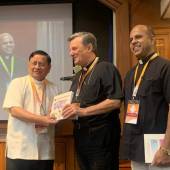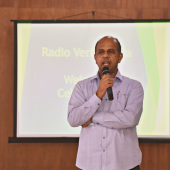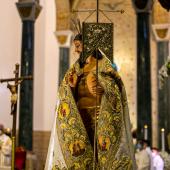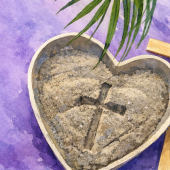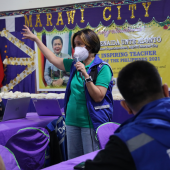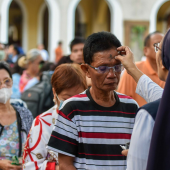Remembering the dead as we await our own ‘transitus’
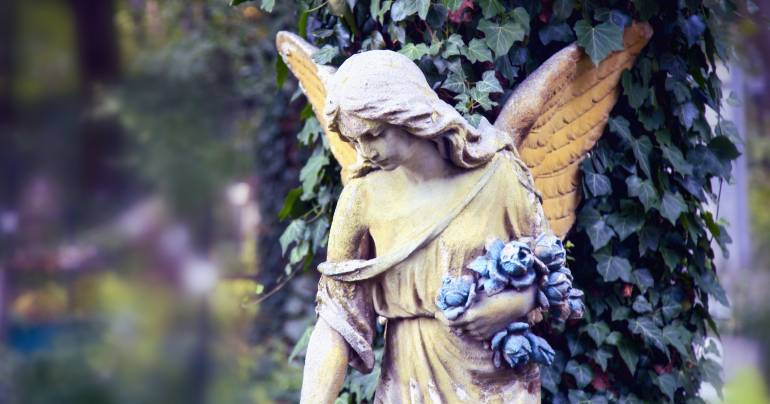
Father George Plathottam, SDB
This is part one of a two-part reflection on death as it becomes an ever more prominent thought in our lives. May these articles help us to confront it in the light of faith.
There is hardly anyone who has not been haunted by the thought of death during these COVID pandemic days. Most of us continue to grieve over the death of persons close to us. There are so many of them.
We are deeply concerned about the dreaded virus with its new variants and the toll it has been taking. Death has struck closer to home and it is no longer a distant reality or a remote possibility. Death seems nearer than before, and during these months and weeks, it is natural that the thought of our own death might have been playing in our minds.
Yet when it comes to our own deaths, we tend to imagine it to be distant — a reality that is remote and removed from us.
When I joined the seminary, we had a monthly spiritual practice called “Exercise for a Happy Death (EHD).” Today it has taken a less intimidating name called “Monthly Recollection.
“The word “death” has disappeared. But back then the EHD had its own purpose and even charm. The thought of death was etched into our being, our spiritual journey and formation. In those days, one could not also think of an annual retreat without at least one talk on death and eternity.
On EHD days we had to put our house in order — tidy up the workplace, study hall and desk, the dormitory, and put our personal belongings in order and discard the things we did not need. We would make a Confession and next morning receive Holy Communion with as much fervour as we could muster.
The EHD was marked by talks and prayers which included grim reminders about death. The “Exercise” ended with a prayer for happy death attributed to St Benedict. The words of the prayer would send shivers through one’s bones for the vivid descriptions about the moment of death.
In the end we also recited one “Our Father,” “Hail Mary,” and “Glory Be,” for “the first among us who would die.”
I do not think at that time anyone of us were keen to claim that prayer for oneself. Even if we thought of death, it would be not about us, but others. None of us were eager to be the first to die!
A fellow Salesian priest who crossed 70 years recently tells people when asked about his current engagements: “Well, you know I am doing PHD.” If you thought he was doing a doctorate at the age of seventy, you are mistaken. He explains his PHD as Preparation for a Happy Death!
You are amused, but that sounds more appealing, and it reduces the sting of our former EHD. We all can join the bandwagon. It is never too late to begin our PHD!
But as the saying goes, whatever goes around comes around.
So, the thought of one’s own death continue to come back, especially when someone of our batchmates or people who we knew well suddenly died.
In the course of these years, four of my own novitiate companions have died — two of them in tragic vehicle accidents, one killed and one due to sickness. There are others too from other batches closer to me, people who studied, prayed, played, ate and worked together, who were called by the Lord. Each of them might have claimed one by one the prayers we said for the first to die.
Prayers in preparation for death forms part of the prayer of the Church and the Catholic faithful. Whether we are conscious or not about death the prayer for a good death is at the heart of the prayer life of the Church.
Recall the last lines of the “Hail Mary,” when we ask the Mother of Christ to “pray for us sinners, now and at the hour of our death.” Think of the thousands of times we may have invoked the name of Mary, Mother of God, with these words. May all those who have gone before us enjoy the benefits of our prayers even as we wait for our turn.
The COCID-19 pandemic has shaken our confidence about the longevity of life and increased the surety of death. We recognize the certainty of death could now be more imminent than we imagine.
There is no getting away from the reality of the finality of life. Some actively contemplate the thought and remain watchful and prepared, while some others try to ward it off. Though the frequency and intensity of such thoughts vary from person to person, the reality of death is as certain as life itself. It is good to live in a sense of anticipation about our own death.
Happy would we be if we do not casually brush aside the thought or lose the opportunity to be reminded of death. Exercises for a happy death, in whatever format we do it, should not be looked upon as some sort of old-fashioned pietistic practice but be considered as a graced opportunity to deal with something of great consequence. Eschatology finds many practical pastoral expressions in the tradition and teaching of the church. A salutary phrase used by many mystics and saints in the past is the Latin phrase, memento morti – “remember your death.”
Father George Plathottam, SDB, is executive secretary of the Office of Social Communication of the Federation of Asian Bishops Conferences. To read more of his articles click here.
Radio Veritas Asia (RVA), a media platform of the Catholic Church, aims to share Christ. RVA started in 1969 as a continental Catholic radio station to serve Asian countries in their respective local language, thus earning the tag “the Voice of Asian Christianity.” Responding to the emerging context, RVA embraced media platforms to connect with the global Asian audience via its 21 language websites and various social media platforms.









